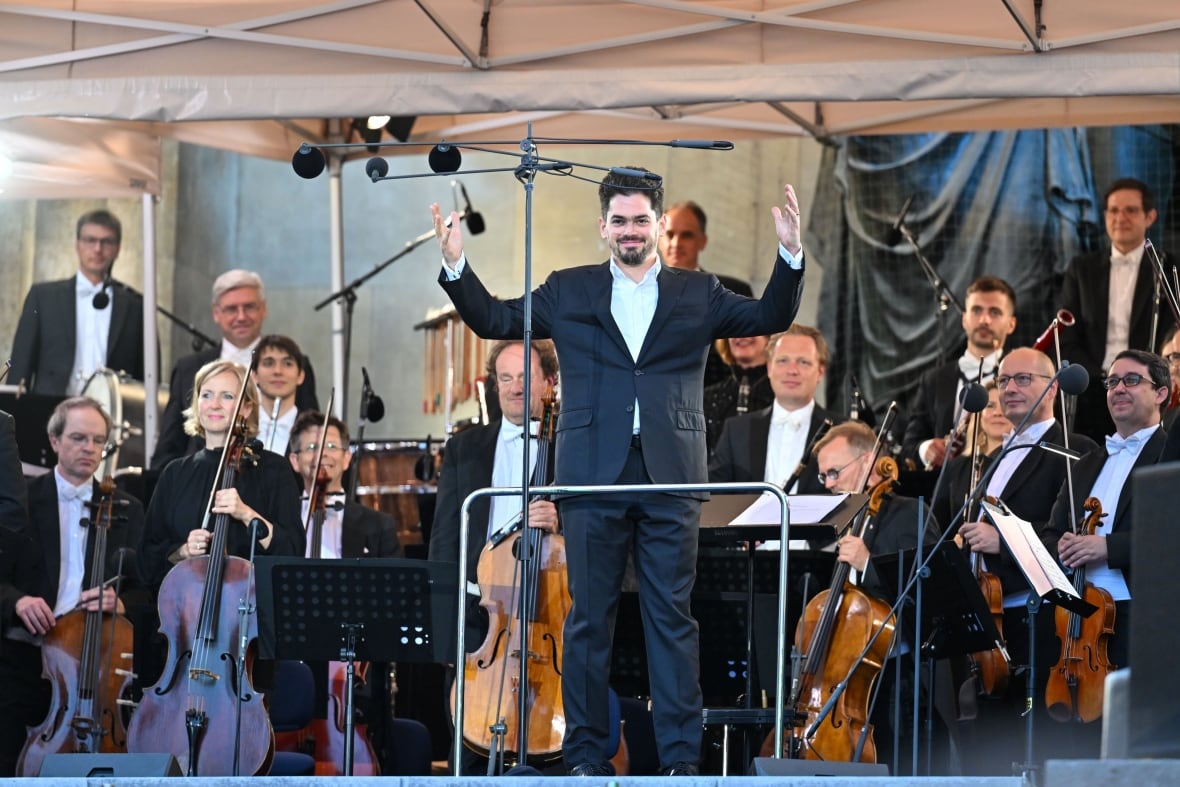Music festival cancels performance led by Israeli conductor over war in Gaza

European politicians are condemning a Belgian classical music festival's decision to cancel an upcoming performance led by an Israeli conductor due to concerns over where he stands on the war in Gaza.
Organizers of the Flanders Festival Ghent announced on Wednesday they were cancelling a performance by the Munich Philharmonic Orchestra slated for Sept. 18. They cited concerns surrounding the orchestra's future chief conductor, Lahav Shani.
Shani, who was born in Tel Aviv, is the director of the Israel Philharmonic Orchestra. Although he's not set to take over the Munich Philharmonic until next year, he was expected to conduct the performance in Ghent, Belgium.
Festival organizers said they made the decision even though Shani had previously spoken out "in favour of peace and reconciliation."
"In light of his role as the chief conductor of the Israel Philharmonic Orchestra, we are unable to provide sufficient clarity about his attitude to the genocidal regime in Tel Aviv," organizers said in a statement.
The statement went on to say that the festival is choosing not to collaborate with partners "who have not distanced themselves unequivocally from that regime."
The festival, a three-week affair showcasing classical music, attracts 50,000 people each year. The Munich Philharmonic's performance was expected to be one of the "artistic highlights" of the festival before the performance was cancelled, organizers said.
Shani did not respond to CBC's request for comment, but the Israeli Philharmonic condemned the move.
"In the world of music and art, there is simply no place for withdrawing an invitation based on one's place of origin," the orchestra said in a statement.
Belgian Prime Minister Bart De Wever condemned the decision in a post on social media, saying it had inflicted "severe damage" on his country's reputation.
"To impose a professional ban on someone solely because of their origin is both reckless and irresponsible," he wrote.
I have understandably received many questions from abroad regarding the recent decision of the Flanders Festival Ghent to ban the Munich Philharmonic on the basis of the conductor’s nationality. This decision has rightfully provoked great consternation and has been characterized…
—@Bart_DeWever
Matthias Diependaele, the minister-president of the Flanders region, also denounced the cancellation, saying art should be used to "build bridges" rather than divide people.
"I somewhat understand that the organization wanted to send a signal, but there are plenty of other ways to respond to this horror. Such a reaction or signal must never come at the expense of an individual, in this case an internationally renowned conductor," Diependaele wrote on X.
German officials also weighed in. Markus Blume, Bavarian minister of state for science and the arts, called the decision "shameful, anti-cultural, and simply a scandal," while Wolfram Weimer, the German commissioner for culture and the media, labelled it "pure antisemitism."
A petition by musicians in Europe demanding the cancellation be reversed garnered more than 11,000 signatures by the time of publication.

The festival's artistic director defended the decision to the New York Times, saying organizers had tried to clarify Shani's beliefs on the ongoing war without success. He also said the decision was "in no way" motivated by antisemitism.
"We do not know where he stands in this conflict, and genocide leaves, in our view, no room for ambiguity," he told the newspaper. "We did not proceed lightly."
CBC News has reached out to representatives for the festival but did not hear back by the time of publication.
As the death toll in Gaza — now surpassing 64,000 — grows and the Israel-Hamas war approaches its second anniversary, artists have sought to condemn or distance themselves from those they see as complicit in the attacks on Palestinians.
Various pledges and petitions have circulated in the arts world in response to the conflict, including one this week signed by more than 4,000 film industry professionals who pledged against working with entities they say are "implicated in genocide and apartheid against the Palestinian people."
Earlier this year, artists boycotted a leading electronic music festival because of alleged ties between its parent company, KKR, and Israel. A number of artists have also said they won't perform in Israel for the time being.
cbc.ca



